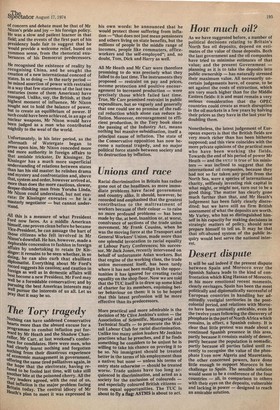Unions and race
Racial discrimination in Britain has rather gone out of the headlines, as more immediate problems have faced government and country alike. It should, however, be recorded and emphasised that the greatest contribution to the maltreatment of workers because of their colour — to raise no more profound problems — has been made by the, at best, inanition or, at worst, connivance of sections of the trade union movement. Mr Frank Cousins, when he was the moving force at the Transport and General Workers' Union, made more than one splendid invocation to racial equality at Labour Party Conferences; his successor, Mr Jack Jones, recently intervened on behalf of unfortunate Asian workers. But that engine of the working class, the trade union movement itself, has been tardy where it has not been malign in the opportunities it has ignored for creating racial equality on the shop floor. Now we are told that the TUC itself is to draw up some kind of charter for its members, enjoining better behaviour on them: it is to be hoped that this latest profession will be more effective than its predecessors.
More practical and more admirable is the decision of Mr Clive Jenkins's union — the Association of Scientific, Managerial and Technical Staffs — to prosecute the Walsall Labour Club for racial discrimination. Unlike too many union leaders Mr Jenkins practises what he preaches, and if he finds something he considers to be unjust he is willing to take his chance on proving it to be so. No immigrant should be treated better in the terms of his employment than a native; but none — unless his terms of entry state otherwise — should be treated worse. Trade unions have too long acquiesced in discrimination, and acted as a society for the exclusion of coloureds — and especially coloured British citizens — from equal opportunities. The TUC is about to fly a flag: ASTMS is about to act.


































 Previous page
Previous page